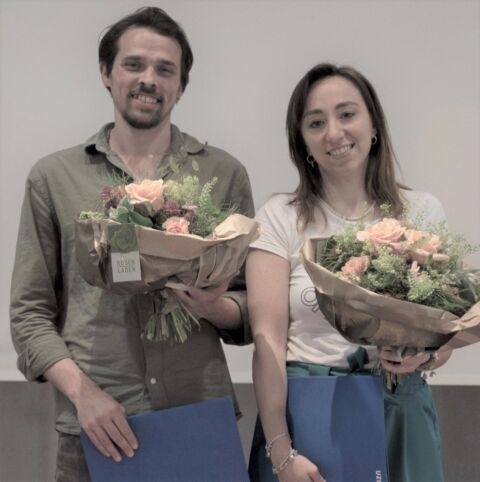The biennial cancer research award recognizes doctoral students, early-career scientists and clinician-scientists of the Comprehensive Cancer Center Zurich, who have made a significant contribution to basic and/or clinical cancer research. The 2023 Ida de Pottère-Leupold and Dr. iur. Erik de Pottère Cancer Research Awards were conferred to Dr. Annalisa Saltari of the Department of Dermatology and Dr. Francisco Caiado of the Department of Medical Oncology and Hematology at USZ. The awards are endowed with CHF 5.000 each.
The award of Annalisa Saltari recognizes her work „Specific Activation of the CD271 Intracellular Domain in Combination with Chemotherapy or Targeted Therapy Inhibits Melanoma Progression“ (Saltari et al., Cancer Research 2021). This Cancer Research paper broke new ground by demonstrating that a receptor (NGFR/CD271), which was thought to be a non-functional biomarker of melanoma stem cells, was pharmaceutically targetable. Previous mechanistic experiments failed to identify any role for CD271 in melanoma, but Dr. Saltari realized that the intracellular death-domain of CD271 could be activated by a 10 amino-acid peptide ligand. She showed in human melanoma cells that the molecular mechanism of apoptosis was dependent on ligand-binding as well as direct phosphorylation and activation of pJNK. She also implicated CD271 in ROS scavenging, which explains the rapid activation of CD271 upon cellular stress induction. This paper led to a novel analog peptide screen that will generate new combination therapies to prevent targeted therapy resistance in melanoma by inhibiting one of the most important mechanisms of adaptive resistance in melanoma stem cells. „Melanoma is still a deadly disease, despite major therapeutic advances in recent years. We could identify a new vulnerability in melanoma: the activation of the intracellular death domain of CD271 expressing cells. The discovery of this mechanism paves the way for the development of new strategies for the treatment of targeted therapy resistant melanoma” remarks Annalisa Saltari.
The award of Francisco Caiado recognizes his work „Aging drives Tet2+/− clonal hematopoiesis via IL-1 Signaling“(Caiado et al., Blood 2023). In this study, Dr. Caiado demonstrated that increased bone marrow interleukin-1 (IL-1) levels during aging drives Tet2-muitant clonal expansion via increased hematopoietic stem cell proliferation and multilineage differentiation. In addition, genetic deletion of IL-1R1 abolishes, and pharmacologic inhibition of IL-1–IL-1R1 signaling impairs, Tet2+/−clonal expansion during aging. This study reveals for the first time a mechanism that drives clonal hematopoiesis in the context of aging. Moreover, it opens the path for therapeutic intervention in clonal hematopoiesis carriers. “Our research reveals a molecular vulnerability in Tet2-mutant clonal hematopoiesis via IL-1 pathway targeting, opening an avenue for the clinical management of clonal hematopoiesis carriers and potentially preventing leukemia onset in this aged population“ says Francisco Caiado.
The award ceremony took place at the scientific retreat of the UZH Cancer Biology PhD Program on 5.6.2023 in Emmetten.
